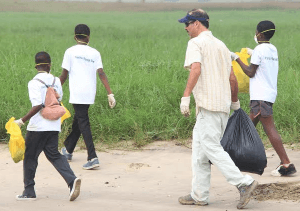Campaign set to sensitise businesses on packaging and pollution

Mrs Kate Opoku, the Country Leader of “Let’s Do It Ghana”, a civic movement, has said as part of activities to reduce land, water and air pollution in the country, the movement would pay visits to businesses.
The visit is to have an encounter with entrepreneurs and their companies, on how their products are highly contributing to pollution and discuss ways to find innovative ways to produce packages to reduce pollution.
She said the step was taken after the company had embarked on a clean-up exercise at the Afia Beach, Accra and collected a heap of plastic waste from branded sachets rubbers, bottles and other food packs.
This, she said, made them realise how much some particular companies greatly contributed to land and water pollution with their products, hence the need for the effort.
Speaking in an interview with the Ghana News Agency, Mrs Opoku said problems of pollution in the country have become unbearable and needed to be addressed with urgency.
“Though, we know our clean-up exercise is not necessarily the solution, the effort was to remind people on the need to reduce plastic usage, reuse plastics and recycle them,” she said.
The Country Leader said the Movement decided to do brand sorting of the rubbish collected after cleaning up the beach as part of the observation of the “World Clean-up Day.”
Mrs Opoku said Let’s Do It Ghana mobilised about 2,500 volunteers nationwide last year, to take part in the clean-up exercise, however, the number increased this year as the exercise was undertaken in many areas including Nima, East Legon, Koko beach, Koforidua, and in the Ashanti Region.
Mrs Louisa Kabobah, the Conservation Education Officer of the Ghana Wildlife Society, said her organisation partnered Let’s Do It Ghana, to embark on the exercise as its mission was to promote the conservation of nature and wildlife in all its form.
One threat to sea turtles, she said, was the heap of rubbish at beaches, which made it difficult for the female ones to lay eggs in the soil, a situation, she said could lead to their extinction and affect the entire food chain.
Source: GNA
